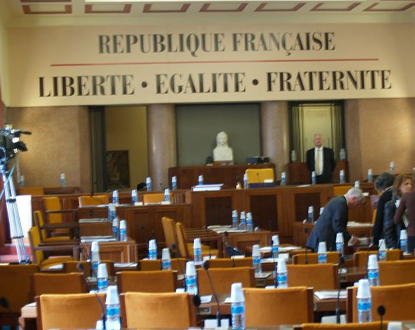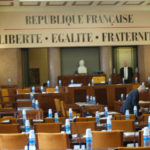We had gotten used to the fact that the duration of a Municipal Council session was correlated to the time of a marathon for former athletes (those the English call with their distinct style, old boys), when they start calculating their time after four hours of racing…
But this autumn edition set a double record: That of length (more than 9 hours!) and the other, of words (not always appropriate or useful) spoken and heard… or not.
Obviously, the long summer break had given the elected officials a boost, and they gave us a performance worthy of its name.
In any case, the endurance test was a success!
Agreed on democracy, but one doubts that Aristotle would have recognized the Athenian boulè in the chaos that was the Nice Municipal Council, where everyone had their say without always knowing what it was about. We even heard about “rate democracy” (we will refrain from mentioning the author’s name out of sympathy), an expression that plunged us into the obscurity of the world of (mis)understanding!
Of course, there are the classics: How could we do without a mano a mano between Dominique Estrosi-Sassone and her traditional opponent Paul Cuturello about social housing?
And how to prevent Christian Estrosi from pouring his ire against the socialist government by accusing them of responsibilities that are not always theirs but sometimes fall to those on the right, of whom he was a part? Against obsession, what can one do?
But in fact, what is the purpose of thematic commissions, if we discuss for half an hour the techniques of fighting pigeons, transforming the chamber into an ornithology forum? Finally, shouldn’t a deliberation, once presented and explained, simply be voted on with or without motivation?
It is true that when the majority overwhelms the opposition, with 52 elected officials to 17 (divided into 4 groups not in agreement with each other), the risk of having bland sessions is high: one opposes, one opposes, but in the end…
Perhaps that’s why some interventions cause applause from colleagues. The atmosphere is saved!
But in the general confusion, there were still some significant deliberations that deserve citation and commentary.
Reforms of school rhythms: We have already returned several times to this thorny issue. If initially, the Government did its part to make this law (or decree) unpopular, one cannot understand the persistence, unique in France, if one reads national newspapers on this argument, of Christian Estrosi to not apply it (including organizing a protest march of rural mayors at the Prefecture). Not to mention the “national” initiative of tax resistance which, fortunately, lasted only a morning.
Reform of children’s school rhythms, quickly appropriated by parents, teachers, and politicians who, far beyond the pedo-psychological interest of children, made it a tool of defense or corporatist claims for some, personal for others, and propaganda action (for or against) for the last.
The case of would-be revolutionaries ready to be photographed in combat gear (the yellow vests) with their children-sandwiches bearing protest signs is the most illustrious example of this drift.
Result? Vague government communication, partial coverage of costs by the State, uncertainty about the sustainability of this aid, extracurricular activities hurriedly set up, discouraging fees resulting in a modest number of registrations, bloated follow-up committees, and a Council of Education aiming to “make proposals with a view to developing a national educational project”. Otherwise what?
Bravo, but above all… adelante Pedro con juicio!
How do you expect a reform to work when one populism opposes another? When it would have sufficed to do things properly and timely instead of making it a point of political opposition and finding a balance between expenses and revenues as Dominique Boy-Mottard so well proposed in her intervention: Why not a progressive fee grid based on family income?
It was too simple to apply some common sense instead of getting lost in endless discussions or making national comparisons with charts and graphs? Ladies and gentlemen of the elected officials, are you sure and certain that families feel comforted or, on the contrary, upset to know that they are paying less or more in Nice than if they lived in another city for the same service?
The latest is the wish voted by the municipal majority to ask the Government for full and sustainable coverage of costs (7 million per year from 2015 for the budget of the City of Nice).
Taking over Semiacs activities: The novelty is relative because Christian Estrosi is an atypical liberal: Instead of privatizing, he retakes under public control all activities in the public service delegation. It remains to be seen whether, under municipal management, this company will continue in its mission to build and manage parking lots to improve urban mobility. We already know that its area of activity will expand to the management of street parking. But doubts remain…
Gare du Sud: Beyond the former station itself (today the Raoul Mille media library), the rest is blocked by a legal dispute with the company that won the tender under Peyrat’s management. Faced with the rather prolonged times that this dossier will involve, regardless of the outcome of the trial, the mayor of Nice wants to move quickly for the transformation of the vast space at the rear which is to include an underground parking lot and a whole commercial, sports (gym), and cultural section with a multi-screen cinema. His goal is to inaugurate this facility within three years.
Obviously, the project is a whole, and it’s understandable: The cost of parking is not the same as that of residential or commercial construction.
But here is Benoît Kandel, former first deputy and president of Semiacs, now an opposition municipal councilor after being stripped of all his delegations and expelled from the ump party group abruptly and with an evidently opportunistic motivation, pointing out that Semiacs would be the tool chosen by the Town Hall for the construction of the parking lot bearing increased costs, with an obvious advantage for the operator who will be tasked with the successive operation of constructing the surface buildings.
“Proof is,” said Benoît Kandel, receiving the (verbal) wrath of the mayor of Nice, “that this operation had been requested of me when I was president of Semiacs, and I refused it to defend the good management of this company,” thus leaving the doubt that his disgrace was not without reason.
Residential tax: Christian Estrosi had already pulled this off just after his previous election: Increasing local taxes (in this case it was by 15%) in the first year and then saying that in the last 5 years, he hadn’t increased taxes. In fact, since the mandate years are 6, this small oversight allows for a full and constant increase, much more profitable than increasing by a few percentage points year after year…the average being, of course, not the same.
Why blame him? Quite the contrary, it’s a masterful move, especially when it succeeds.
Only this time, being Christian Estrosi the successor to himself, it is difficult to attribute the responsibility to his … predecessor. Especially when the electoral promise is: Zero tax increase.
Thus, the camouflage requires more imagination: Instead of increasing the residential tax, they reduce the basic abatement rates from 15 to 10%. But, without delving too much into mathematical meanderings, it suffices to apply the basic rule of algebra: The -5 of -15 = +5.
This is called creative finance!
Which in cash means +6.5 million euros at the expense of Nice taxpayers (and +2.5 million additionally levied for the Metropole) according to Patrick Allemand’s calculations).
Moreover, it is the first deputy, Philippe Pradal, who himself says in his intervention: “Faced with the drop in State allocations of 12 million, the extra revenue rises to 6 million”.
Nothing wrong, it is the Mayor’s responsibility to manage the finances of the municipality in a balanced manner, and regardless of what one thinks, two plus two is always equal to four.
But then why not call things by their names?



